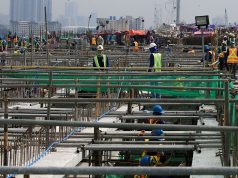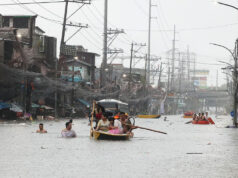P2B revenue seen from regulated rice trading in ZAMBASULTA

AGRICULTURE SECRETARY Emmanuel F. Piñol said the government stands to earn as much P2 billion in annual revenues if it “legalizes rice smugglers” in the southwestern part of Mindanao.
In a post on his Facebook page Wednesday, Aug. 29, Mr. Piñol explained that legalizing these operators means giving them proper documentation and imposing minimal tariffs on them to make them legitimate rice importers.
The agriculture chief said these smugglers are actually paying “tara” or bribe money for their illegal activities.
“When the rice supplies coming in through the Southern Islands are charged with tariffs and duties, documented, inspected by Quarantine Officers and the needed volume controlled,” he said, it will no longer be considered smuggling, but legal importation of rice.
“In fact, this proposal is expected to earn the government an estimated P2-billion in revenues every year. It will also ensure stable rice supply in the ZAMBASULTA Area which is totally dependent on smuggled rice,” Mr. Piñol added.
ZAMBASULTA refers to the Zamboanga Peninsula Region, and the island provinces of Basilan, Sulu, and Tawi-Tawi, which are under the Autonomous Region in Muslim Mindanao.
A day earlier, Mr. Piñol said there is actually no shortage of rice supply from local farms, but the high prices in the market is a result of higher purchase price from farmers due to the shortage in stock from the National Food Authority (NFA) and imported rice. The storms and typhoons which have entered the country have also contributed to a lower number of rice production, according to Mr. Piñol.
A strengthened campaign against smugglers also caused the decreased supply in ZAMBASULTA.
TRADING CENTER
Mr. Piñol said regulating rice trading there would also require the establishment of a main trading center in Tawi-Tawi, the southernmost island in the country.
“The Tawi-Tawi Rice Trading Center is expected to give government full control of the illegal rice trading in the ZAMBASULTA Area which for decades now has been operated by smugglers,” Mr. Piñol said, noting that an estimated 200,000 metric tons of rice from Vietnam and Thailand are brought in by smugglers through Malaysia.
“When the local rice industry has been revived, the volume of imported rice which would be allowed to be brought in through the Tawi-Tawi Rice Trading Center will be reduced so as not to adversely affect the local rice farmers,” Mr. Piñol said.
Meanwhile, the House of Representatives Minority bloc blasted Mr. Piñol’s proposal.
The lawmakers, led by Quezon Rep. Danilo E. Suarez, also called for the resignation of the secretary as well as other officials in charge of the rice sector.
“It’s plain stupidity to call for legalization of smuggling of agricultural products,” Deputy Minority leader Alfredo A. Garbin Jr. said in a press briefing.
“If you are the secretary of the Department of Agriculture (DA), calling the legalization of smuggling, that’s plain economic sabotage that will endanger not only our economy, but of course our local farmers,” he added.
Senior Minority Deputy leader Jose L. Atienza Jr. said, “The NFA (National Food Authority) NFA Council, the secretary of agriculture, if you cannot handle the proper provision of food for the Filipino… mag-resign kayong lahat (you should all resign).”
Vice President Maria Leonor G. Robredo, for her part, called for a unified “game plan” among all government agencies involved.
“Isa lang sana iyong plano ng ating pamahalaan — hindi iyong iba ang plano ng Council, iba iyong plano ng Administration, iba iyong plano ng DA as an agency… Ano iyong game plan? Saan tayo patutungo? (There should be a unified plan… what is the game plan? Where are we headed?),” Ms. Robredo said.
ZAMBOANGA CITY
In Zamboanga City, 1st District Rep. Celso L. Lobregat called on the local government to lift the declaration of state of calamity given the substantial amount of rice supply arriving in the city.
“If I were to be asked, it should be lifted because we don’t need the state of calamity anymore to buy rice,” Mr. Lobregat said in an interview with the local media.
Last week, the city council declared a state of calamity following weeks of rice supply shortage in the markets due to the intensified crackdown on rice smuggling, delay in the arrival of imported commercial rice, and the off-harvest season.
Emergency funds were used by the city government to purchase rice for distribution to the markets at controlled prices.
However, Vice Mayor Cesar S. Iturralde, chair of the city council, said they are keeping the state of calamity for now as support to the continued monitoring of rice prices.
“Considering there is an improved supply of rice now, we expect that the price will be normalized in a few days,” Mr. Iturralde said.
FAO
In another development, the United Nations Food and Agriculture Organization (FAO) has launched the new FAO Country Programming Framework (CPF) 2018-2024 for the Philippines, a six year plan to further develop the country’s agricultural sector and achieve food security.
According to FAO, the growth of the Philippine agricultural and forestry sectors are continuously hampered by limited implementation of technology, degradation of natural resources, and high vulnerability to climate change.
“Now, more than ever, is the time when we need to focus our investments on agriculture and rural development so that we can move forward and get back on our feet faster than the threats and disasters that jeopardize our food security and that of generations to come,” FAO Representative in the Philippines Jose Luis Fernandez said in a statement. — Reicelene Joy N. Ignacio, Charmaine A. Tadalan, and Albert F. Arcilla



